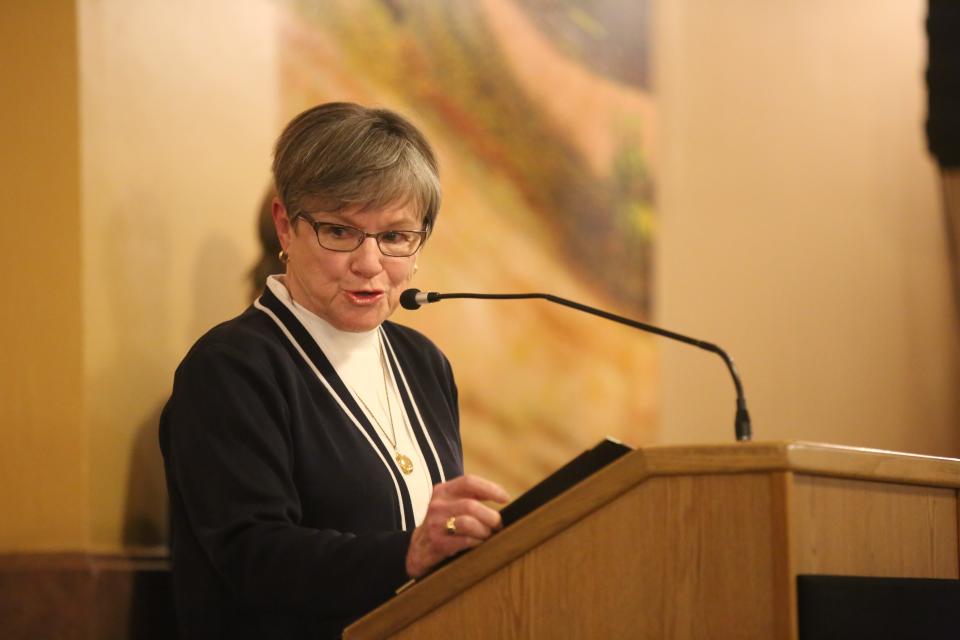Laura Kelly vetoes Republican tax cut plan, calls it 'reckless' and 'back to Brownback'
- Oops!Something went wrong.Please try again later.
- Oops!Something went wrong.Please try again later.
Democratic Gov. Laura Kelly has delivered her promised veto of a Republican tax cut plan featuring a flat tax.
"I support responsible tax cuts, but I refuse to sign into law a reckless flat tax that would take us back to Brownback while doing next to nothing for the middle class," Kelly said in a Friday statement. "This flat tax experiment would overwhelmingly benefit the super wealthy, and I'm not going to put our public schools, roads, and stable economy at risk just to give a break to those at the very top."
Republicans have made a single-rate income tax, also known as a flat tax, a top priority this session. A flat tax is a nonstarter for Democrats, who view it as primarily benefiting the wealthy.

Republican leadership bundled that controversial item with several bipartisan proposals into House Bill 2284 and called it a compromise, even after kicking Democrats off the conference committee. But they have also taken credit for each of the pieces, calling them all Republican ideas.
Using a shell bill in the conference committee process also meant lawmakers circumvented the normal legislative process in order to create the HB 2284 package and fast-track it. No hearings with public comment were held on the bill.
"This is a compromise plan, and governor, you should sign this," said House Speaker Dan Hawkins, R-Wichita.
But Kelly had previously promised to veto the bill, and she did so at the first possible opportunity.
While the bill passed the House on Jan. 17 and the Senate on Jan. 18, it wasn't immediately sent to the governor. Masterson and Hawkins on Tuesday held a ceremony to sign the bill before sending it to the governor — a procedural step normally done without any fanfare.
But it wasn't until Friday — the last possible weekday under the deadlines established in the Kansas Constitution — that the Legislature actually sent the bill to the governor. Kelly vetoed it the same day.
"Today the governor yet again put her radical ideology ahead of the people," Senate President Ty Masterson, R-Andover, said in a statement. "She is so focused on hyper-partisan politics that she has again vetoed a compromise tax plan that was primarily designed to increase the take home pay for every Kansan and bring sustainable tax relief for hard-working taxpayers who are suffering under Bidenflation. The governor has proven again that she has abandoned the middle."
Hawkins said "the Governor said 'no' to property tax relief that automatically adjusts for inflation, an elimination of income tax for 300,000 lower income Kansans, a total elimination of property tax for some homeowners, a simpler tax code, an elimination of the sales tax on food, and an elimination of the sales tax on social security."
What happens next?
Republicans will try to override the governor's veto, and they have 30 days to do so.
It will start in the House, where a supermajority is 84 of 125 representatives. The bill passed the House 81-37. There were four absent Republicans who have previously voted in favor of a different flat tax bundle.
The Senate is where the GOP has a problem, as they did last year. A supermajority is 27 of 40 senators. The bill passed Senate 25-11, and one of the absentees was a Republican who has previously voted against a flat tax.
It is unclear what will happen next if Republicans fail to override the veto.
Plenty of time remains before the anticipated end of the legislative session on April 30, but Kelly is already threatening to call a special session.
"While I urge the legislature to take this irresponsible flat tax experiment off the table once and for all, know that I will not let legislators leave Topeka this year without meaningfully and responsibly cutting taxes for middle-class families," Kelly said. "I will call a special session if I have to — anything to ensure Kansans see tax relief, immediately. Let's work together to cut taxes in a way that continues our economic growth while benefiting all Kansans, not just the wealthiest."
Meanwhile, after initial objections to introducing Kelly's tax cut proposal, the Senate tax committee now has Senate Bill 377 scheduled for a hearing on Wednesday.
How much would the tax cuts cost?
The state last reported a $2.8 billion projected surplus for the current fiscal year with $1.7 billion in a rainy day fund.
The Republican tax cut plan amounts to $1.6 billion in tax cuts over the next three fiscal years.
Projection's from the governor's budget office forecast the state general fund would hit a deficit within five years. The hole in fiscal year 2029 would be about $515 million.
Republicans have blamed spending, citing an analysis from the Kansas Policy Institute suggesting $1.6 billion in increased spending incorporated into the governor's budget projections.
Budget director Adam Proffitt previously told lawmakers that the governor was proposing a 2.2% increase in the base budget while using $1.3 billion for one-time expenses, especially ones that either pay off debt early or avoid taking on new debt.
Masterson thinks there is a different reason the governor wants to spend that $1.3 billion.
"That sole purpose is to drop the ending balance to make this tax cut look unsustainable," he said.
Jason Alatidd is a Statehouse reporter for the Topeka Capital-Journal. He can be reached by email at jalatidd@gannett.com. Follow him on X @Jason_Alatidd.
This article originally appeared on Topeka Capital-Journal: Laura Kelly vetoes Kansas GOP flat tax cut, calls it back to Brownback

